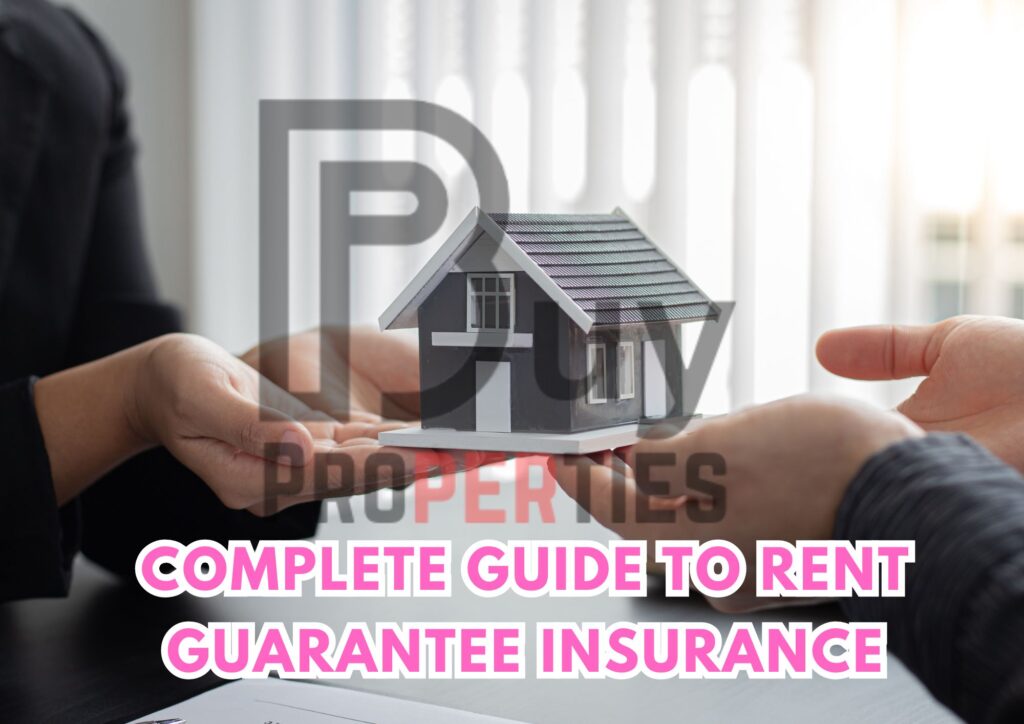Rent Guarantee Insurance: What Is It?
When a tenant doesn’t pay their rent, rent guarantee insurance pays back the landlord for the money they would have lost. If the renter defaults, the insurance covers the rent each month for a predetermined amount of time.
In the US, this kind of risk management product is comparatively new. The British brought the custom with them.
ESSENTIAL NOTES
- Landlords are shielded from income loss in the event that a tenant defaults on rent by rent guarantee insurance.
- The premiums are normally covered by the landlord, but if the lease expressly states otherwise, or if additional rent is required from the tenant, then that requirement may apply.
- When underwriting a policy, insurers will consider the tenant(s)’ creditworthiness and financial stability.
Comprehending Rent Guarantee Insurance
Leasing parties have access to a variety of insurance options to guard against financial losses. The structures and their belongings may be covered by insurance against theft or damage, and certain plans may also pay for the expense of evicting a tenant. Generally speaking, these policies don’t cover expenses incurred when rent isn’t paid by tenants.
Rent guarantee insurance takes care of that specific requirement. In the event of a tenant default, the policies are intended to safeguard the landlord’s revenue.
Rent guarantee insurance provides protection to the landlord rather than the tenant, much like private mortgage insurance (PMI). In the event that the renter defaults, the insurance company, in its capacity as guarantor, pays the rent for the duration of the agreement.
Tenant Is Still at Risk
A tenant who defaults on their rent is still responsible for the unpaid rent and any associated legal costs, regardless of whether the landlord has rent guarantee insurance. A noncompliant tenant may be subject to legal action by the guarantor, which may include eviction and credit agency reporting.
State and local laws govern the extent of the tenant’s liability.
Twelve months
After a tenant defaults, rent guarantee insurance typically covers lost income for up to 12 months, or until the tenant resumes payments or is replaced by a new tenant.
Who Requires Insurance for Rent Guarantees?
Depending on how well their tenant screening procedures work to guarantee payment, some landlords may choose not to pay for rent guarantee insurance.
Nonetheless, things can alter. Tenants might get a job offer from another state, lose their jobs, or get divorced.
The nonpayment of rent by a tenant can have dire consequences for a landlord who depends on rental income to cover other costs or pay the mortgage.
Guaranteed rent agreements are not the same as rent guarantee insurance. With guaranteed rent agreements, landlords can assign property management to a business or real estate agent in return for a predetermined sum of money. If the tenant defaults or the property is unoccupied, the owner will still receive payment in these situations.
Tenants can avoid having to pay for the landlord’s insurance by including the cost of coverage in their monthly rent.
Restrictions on Rent Guarantee Insurance
Rent guarantee insurance is not provided by insurers without thorough investigation. This implies that a renter’s application to safeguard their rental payments is likely to be denied if they have a history of nonpayment.
Additionally, in order for a landlord to be eligible for this type of coverage, the tenant must be employed consistently and make a sufficient income to cover the rent on the unit they rent. If not, the insurer will insist on the presence of a guarantor to make up for any shortfalls.
When the Story Begins
Generally speaking, rent guarantee insurance kicks in after a month of nonpayment by the tenant. A policy without any time lag can be purchased, but the premiums will be higher.
Either way, the security deposit paid by the tenant usually covers the first month’s loss.
What Sort of Coverage Is Required by a Landlord?
The following components of a quality landlord insurance policy should be present:
coverage for a variety of unfavorable events, such as fires, earthquakes, and damage caused by tenants, to occur to property.
Insurance against lost rental income to cover any time the property is unusable due to an unforeseen circumstance.
liability defense in the event that a renter or guest is hurt on the property.
Though it’s relatively new, rent guarantee insurance is something to think about if you rely on a steady flow of rental income.
Homeowners’ Policy versus Landlord Policy
The coverage offered by homeowners’ insurance and landlord insurance differs significantly in a few important ways. Selecting the coverage that best meets your needs can be made easier if you are aware of these differences.
One Time or Irregular Short-Term Rentals
Your homeowners insurance might not cover you entirely if you decide on a whim to rent out your primary residence for a single weekend. Discuss your plans with a Travelers representative or your neighborhood independent agent. Certain homeowners policies might include coverage for short-term, one-time rentals; alternatively, you might need to add a rider or endorsement to your policy to get the protection you require (like coverage for short-term home sharing).
Your homeowners policy probably won’t offer the protection you need if that one-time rental becomes something you do on a regular basis. Instead, you should obtain special coverage for your short-term rentals. Many people end up becoming unintentional landlords in this way: by using home-sharing services to rent out their house a few times a year. However, you might benefit from landlord insurance if you frequently rent out your house. It contributes to the preservation of the home’s framework as well as the furnishings you have rented out. It can also pay for medical expenses in the event that someone is hurt on your property, as well as liability for property damage or bodily injury resulting from the use of your property.
Long-Term Leases: Minimum of One Month
Coverage for long-term rentals can be challenging. Consider it this way:
If you are renting out your entire property for an extended period of time without living there, you should get landlord insurance.
If you have a renter residing in a portion of your house while you are still the primary occupant, you should get homeowners insurance. To find out if your homeowners policy will cover your circumstances, speak with your Travelers representative or independent agent.
Because long-term tenants spend more time there and may have more visitors, extended stays can result in increased wear and damage to the property as well as an increased risk of injury. You might be responsible for paying for repairs, legal fees, or medical expenses if you are not covered.
Rentals of Vacation Homes and Investment Properties
A primary residence that is occupied is the intended use for homeowners insurance. Landlord coverage is necessary if you regularly rent out your property; otherwise, properties that are unoccupied for a significant portion of the year must have their own specific insurance, such as vacant home coverage.
As previously mentioned, landlord insurance is intended to address these kinds of circumstances since it provides coverage for liability issues, damage to the property, and certain personal items like appliances and lawnmowers. You won’t have enough coverage for long-term rentals if you don’t have landlord insurance. Check out our list of factors to think about when renting out your house or investment property if you’re still unclear about the coverage you require.
Cost of Homeowners Insurance vs. Landlord
Because landlord insurance provides specific protections against the particular risks associated with renting your property, the cost of landlord insurance differs from that of homeowners insurance.
It may be worthwhile to purchase landlord insurance due to the protections it provides. In most cases, rental compensation will prevent you from losing money in the event that the rental property is temporarily unusable, as might happen during repairs following a kitchen fire. Landlord insurance can pay for your legal costs and any covered damages if a tenant or a guest is injured on the property and you are held accountable for their injuries.
Is Home Insurance or Landlord Insurance Necessary?
Be cautious not to become an unintentional landlord if you plan to rent out your property for a short period of time (such as a weekend getaway or short-term vacation). Your homeowners policy might not cover any resulting losses, damages, or liabilities from that rental experience. It could be expensive to not have the right coverage because you might be liable for any resulting medical expenses, court costs, or property damage.
Request a Quote for Landlord or Homeowners Insurance
Don’t freak out if you’ve realized you might be an unintentional landlord. Finding coverage that suits your needs by getting in touch with a Travelers representative or your neighborhood independent agent is the first step towards obtaining the right coverage.
When you combine new coverage with current policies, you might be able to save money on landlord insurance or other coverage. To obtain the coverage you require, take the initial action. Find out more about landlord insurance, then get a quote right now by getting in touch with a Travelers representative or your neighborhood independent agent.
What Distinguishes Renters Insurance From Homeowners Insurance?
Renters insurance is far more affordable. Only the contents are covered by the policy; the structure is not.
What is Covered by Renters Insurance
coverage provided by renters insurance
You’ll need renters insurance to safeguard your personal belongings even though your landlord’s insurance covers the building and any landlord-owned property.
There are three main coverage categories included in a standard renters insurance policy:
The cost of losses and property damage to your personal belongings in the event of a covered loss, such as a kitchen fire, windstorm, hail, smoke, vandalism, theft (inside or outside your home), freezing, lightning, and more, can be partially covered by personal property coverage. Just keep in mind that your personal property coverage does not extend to any furnishings or other landlord-owned property.
Temporary living expenses, also known as loss of use coverage, helps pay for any additional costs you may have if you have to leave your house for an extended period of time (think food, lodging, laundry, and the like).
If someone is unintentionally hurt at your property, personal liability and medical expense coverage may help cover the costs of any losses you may be held accountable for.
You may wish to add more coverage to your policy if you have a few items that fall into specific categories and are very valuable. Renters can improve their security by adding Extra Coverage for valuables such as musical instruments, bikes, jewelry, cameras, and fine art for a fee. In addition to the advantages of a standard renters insurance policy, Lemonade’s Extra Coverage provides coverage for “mysterious losses,” accidental damage, and deductible-free claims.
While renters insurance usually covers some natural disasters, such as tornadoes, sinkholes, and volcanic eruptions, it usually excludes flooding, earthquakes, and sinkholes. Furthermore excluded from coverage are items that are not properly documented (though Lemonade’s claims team will follow up to help with claims on any items for which you don’t have proof of ownership, like receipts or email order confirmations), mold, damage from pets or pests, and theft of your car.
Do you share a room with someone? You will each need to have your own policy if you want your personal belongings insured because your renters insurance will not cover their property.
The Cost of Renters’ Insurance vs Landlord Insurance
An owner’s policy will usually cost more than renters insurance because it is more costly to insure a piece of real estate. In the United States, the average premium for renters insurance is $186 annually, or $15.50 per month, whereas the average cost of landlord insurance is $1,288 annually, or roughly $107 per month.
The Final Word
In order to safeguard your investment, landlords should think about obtaining rent guarantee insurance in addition to their regular landlord insurance. Even the most trustworthy renters occasionally have personal or financial setbacks that prevent them from being able to pay their rent. Rent guarantee insurance is a wise investment if you depend on that monthly rent income to keep your business operating smoothly.



